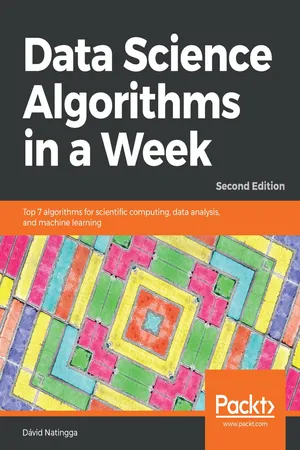
Data Science Algorithms in a Week
Top 7 algorithms for scientific computing, data analysis, and machine learning, 2nd Edition
Dávid Natingga
- 214 pagine
- English
- ePUB (disponibile sull'app)
- Disponibile su iOS e Android
Data Science Algorithms in a Week
Top 7 algorithms for scientific computing, data analysis, and machine learning, 2nd Edition
Dávid Natingga
Informazioni sul libro
Build a strong foundation of machine learning algorithms in 7 days
Key Features
- Use Python and its wide array of machine learning libraries to build predictive models
- Learn the basics of the 7 most widely used machine learning algorithms within a week
- Know when and where to apply data science algorithms using this guide
Book Description
Machine learning applications are highly automated and self-modifying, and continue to improve over time with minimal human intervention, as they learn from the trained data. To address the complex nature of various real-world data problems, specialized machine learning algorithms have been developed. Through algorithmic and statistical analysis, these models can be leveraged to gain new knowledge from existing data as well.
Data Science Algorithms in a Week addresses all problems related to accurate and efficient data classification and prediction. Over the course of seven days, you will be introduced to seven algorithms, along with exercises that will help you understand different aspects of machine learning. You will see how to pre-cluster your data to optimize and classify it for large datasets. This book also guides you in predicting data based on existing trends in your dataset. This book covers algorithms such as k-nearest neighbors, Naive Bayes, decision trees, random forest, k-means, regression, and time-series analysis.
By the end of this book, you will understand how to choose machine learning algorithms for clustering, classification, and regression and know which is best suited for your problem
What you will learn
- Understand how to identify a data science problem correctly
- Implement well-known machine learning algorithms efficiently using Python
- Classify your datasets using Naive Bayes, decision trees, and random forest with accuracy
- Devise an appropriate prediction solution using regression
- Work with time series data to identify relevant data events and trends
- Cluster your data using the k-means algorithm
Who this book is for
This book is for aspiring data science professionals who are familiar with Python and have a little background in statistics. You'll also find this book useful if you're currently working with data science algorithms in some capacity and want to expand your skill set
Domande frequenti
Informazioni
Naive Bayes

- How to apply Bayes' theorem in a basic way to compute the probability of a medical test that is correct in the simple example medical test
- How to grasp Bayes' theorem by proving its statement and its extension
- How to apply Bayes' theorem differently to independent and dependent variables in examples of playing chess
- How to apply Bayes' theorem to discrete random variables in examples of medical tests and playing chess, and for continuous random variables in an example of gender classification using the probability distribution of the continuous random variable
- How to implement an algorithm in Python to calculate the posterior probabilities of using Bayes' theorem
Indice dei contenuti
- Title Page
- Copyright and Credits
- Packt Upsell
- Contributors
- Preface
- Classification Using K-Nearest Neighbors
- Naive Bayes
- Decision Trees
- Random Forests
- Clustering into K Clusters
- Regression
- Time Series Analysis
- Python Reference
- Statistics
- Glossary of Algorithms and Methods in Data Science
- Other Books You May Enjoy